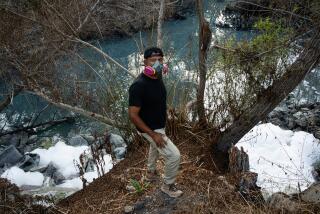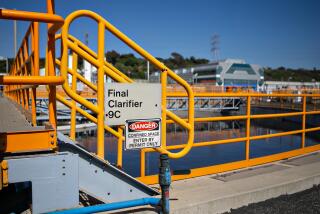Their Solid Service Is a True Civic Duty
- Share via
You think joining the Army is tough civic duty? Imagine being a grand juror and investigating biosolids. Sunshine patriots need not apply.
Undaunted, the Orange County Grand Jury tackled the subject, and doggone it, somebody ought to read the 15-page report it issued Tuesday. So, I did.
It’s tantalizingly titled “Does Anyone Want Orange County Sanitation District’s 230,000 Tons of Biosolids?,” and let me suggest the finished product is not exactly the Warren Report. Left up to me, I might have insisted that one of the sections not be titled “National Trends in Biosolids Utilization.”
Folks, maybe something a bit sexier?
You’re probably asking, “Say, what the heck are biosolids?” The report defines them as “nutrient-rich materials that are a byproduct of the wastewater treatment process.” I can’t explain it any further than that, other than to state emphatically it’s not something you want spilled on your pants.
The investigation apparently stemmed from the public’s increasing resistance to having the stuff spread in their communities. Biosolids have beneficial use as fertilizer and soil enhancers in rural areas.
But, you know how some people will complain about anything. The No. 1 complaint, the grand jury found, was odor.
The Environmental Protection Agency’s descriptions of the odor “often include such terms as musty, earthy and ammonia,” the grand jury says, while “the more folksy terms found in complaints include ‘noxious,’ ‘horrible,’ ‘putrid,’ ‘nauseating,’ ‘eye-watering’ and ‘sickening.’ ”
The panel made recommendations you probably don’t care about. In all honesty, I didn’t, but I marveled at who would be willing to devote his or her day to working on a project like this. All in the name of civic duty.
Well, if they’re all like Joe Moreland, they’re good-natured, retired hydrologists who live in Orange. I asked Moreland, 61, how he hung in there day after day, hour after hour, especially when information like this arrived over the transom: “The pathogen reduction and vector-attraction reduction requirements are presumptive, rather than measured limits.”
He chuckled. “I have an interest in the subject, so it wasn’t painful for me,” he says. “To be totally frank, I probably had more interest than anyone else.” Without naming names, he acknowledged that, among some fellow jurors, “their eyes glazed over.”
Jurors serve 12 months and get $50 a day. They generally work weekdays from midmorning to midafternoon and tackle a range of public issues.
I doubt the average citizen knows much about grand juries. I suggest to Moreland that the perception is that jurors enter a long, dark cave and are never seen again. “That’s probably not a bad description,” he says. “Everything we do, we do in top-secret secrecy. We can’t talk about how we do it and what we do, even what our quarters look like.”
Of course, juries issue reports and try to improve their communities.
Moreland would be the first to say a treatise on the biosolids movement in Orange County may not captivate the public. But it was just one of a few things his committee (six of the 19 overall jury pool) worked on, he says.
“I applied because I wanted to give something back to the community, and I really had no idea what the grand jury did,” he says of his tenure. “I was totally flabbergasted when I was selected and found out what it was all about.”
He’s now more knowledgeable than most about the National Biosolids Partnership and EPA Standards for the Use and Disposal of Sewage Sludge, and says he’d sign up for the grand jury again.
“I found the whole experience to be very refreshing,” he says.
*
Dana Parsons’ column appears Wednesdays, Fridays and Sundays. He can be reached at (714) 966-7821 or at dana.parsons@latimes.com. An archive of his recent columns is at www.latimes.com/parsons.


